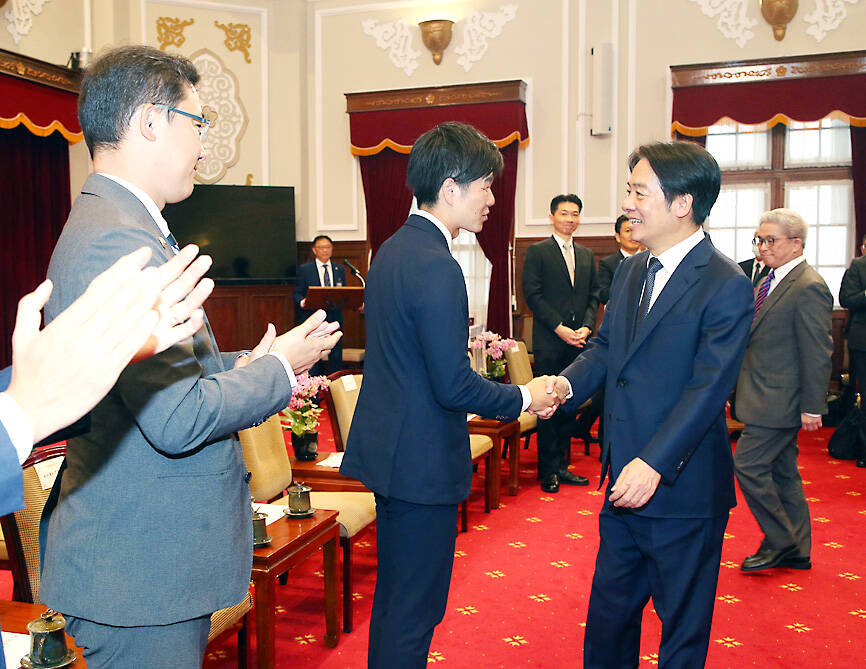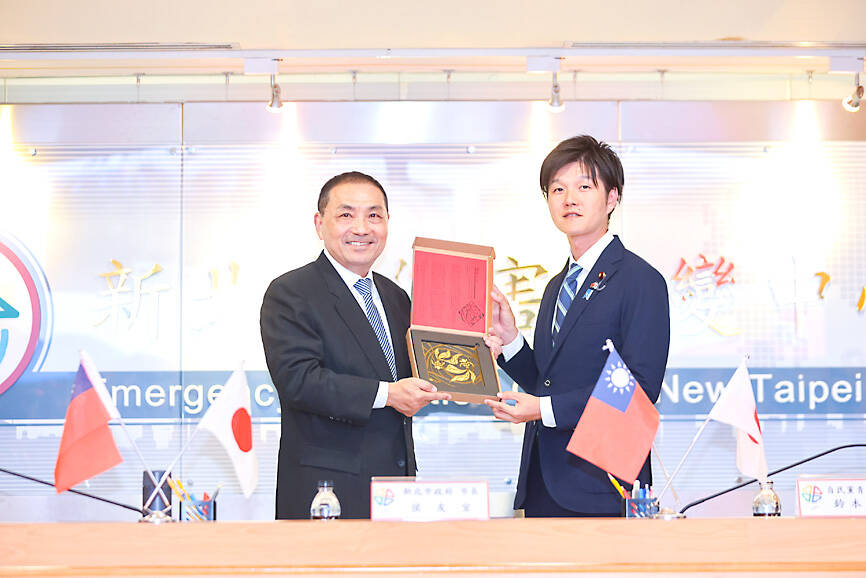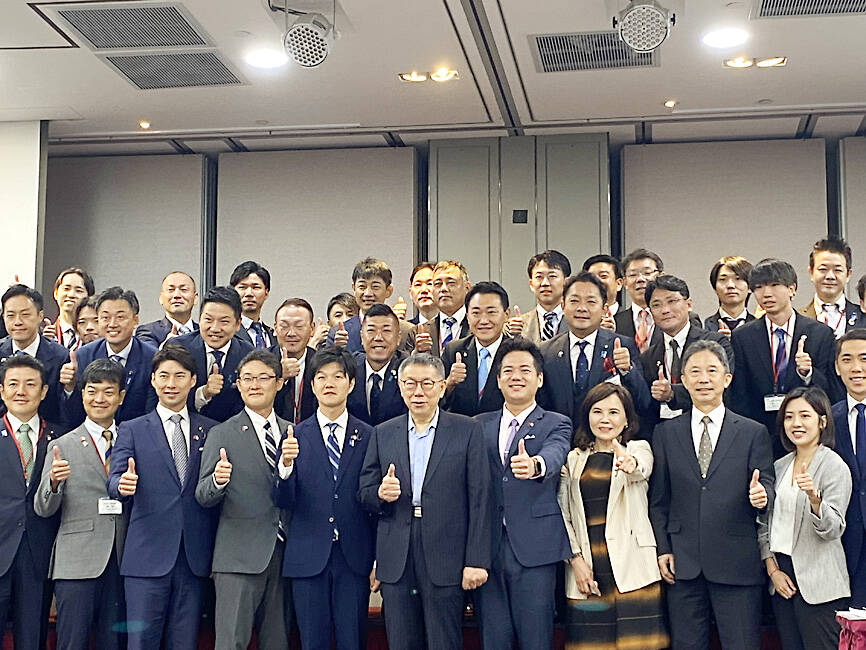Taiwan and Japan are working together to safeguard peace and stability and bring prosperity to the Indo-Pacific, Vice President William Lai (賴清德) told a delegation led by Japanese Liberal Democratic Party (LDP) Youth Division director Norikazu Suzuki yesterday.
Suzuki, a member of the Japanese House of Representatives, is leading a 65-person LDP delegation comprising members of the Japanese Diet, local representatives and university students on a four-day visit to Taiwan until Wednesday.
Lai welcomed the delegation at the Presidential Office yesterday, saying he was happy to see that the Youth Division has close ties with Taiwan, as its members are Japan’s hope for the future.

Photo: CNA
Taiwan and Japan not only enjoy good relations in tourism but also in trade — Taiwan is Japan’s fourth-largest trading partner and Japan is Taiwan’s third-largest trading partner, with total bilateral trade reaching a record US$88.2 billion last year, he said.
The relationship between Taiwan and Japan is “a true friendship” based on universal values such as democracy and human rights, Suzuki said.
Japan sees Taiwan as a very important partner, he said, adding that peace and stability in the Taiwan Strait are closely linked to the peace and stability of Japan and the international community.

Photo: Lai Hsiao-tung, Taipei Times
The Youth Division constantly thinks about what actions it can take to promote peace and stability in the Asia-Pacific region, he added.
Suzuki said he hopes to take the friendship between Taiwan and Japan to another level in many different fields based on the good foundation that has been built.
Separately, Taiwan People’s Party (TPP) Chairman and presidential candidate Ko Wen-je (柯文哲) yesterday told the delegation that changing Taiwan’s political culture has always been his goal.

Photo: Huang Chin-hsuan, Taipei Times
He told Suzuki that he wanted to run for president during a meeting in Taipei in May last year.
Yesterday, Ko said that “as a politician, it is important to walk the talk,” the TPP said in a news release, adding that Suzuki said Ko’s practice-what-you-preach spirit is worth learning from.
Ko shared his thoughts on the challenges Taiwan’s democracy is facing, saying that there have been no major construction plans in Taiwan since 2000 as all efforts have focused on elections, the party said.
Taiwanese politicians seldom mention policies during their campaigns, but instead focus on attacking their opponents, Ko said.
He said he hopes to create a government that values public participation, openness and transparency and sustainable prosperity.
The delegation also met with New Taipei City Mayor Hou You-yi (侯友宜), the Chinese Nationalist Party’s (KMT) presidential candidate, at the New Taipei City Central Emergency Operations Center yesterday.
The city has maintained substantive cooperation in disaster prevention with Japan, such as by signing a mutual support agreement on disaster prevention with Kanagawa Prefecture in 2016, Hou said.
The city established its Youth Department last year and hopes to engage in more exchanges with the LDP Youth Division, Hou said.
The delegation could learn more about the center’s operations and its emergency data platform during the visit, he added.

Chinese Nationalist Party (KMT) Chairman Eric Chu (朱立倫), spokeswoman Yang Chih-yu (楊智伃) and Legislator Hsieh Lung-chieh (謝龍介) would be summoned by police for questioning for leading an illegal assembly on Thursday evening last week, Minister of the Interior Liu Shyh-fang (劉世芳) said today. The three KMT officials led an assembly outside the Taipei City Prosecutors’ Office, a restricted area where public assembly is not allowed, protesting the questioning of several KMT staff and searches of KMT headquarters and offices in a recall petition forgery case. Chu, Yang and Hsieh are all suspected of contravening the Assembly and Parade Act (集會遊行法) by holding

PRAISE: Japanese visitor Takashi Kubota said the Taiwanese temple architecture images showcased in the AI Art Gallery were the most impressive displays he saw Taiwan does not have an official pavilion at the World Expo in Osaka, Japan, because of its diplomatic predicament, but the government-backed Tech World pavilion is drawing interest with its unique recreations of works by Taiwanese artists. The pavilion features an artificial intelligence (AI)-based art gallery showcasing works of famous Taiwanese artists from the Japanese colonial period using innovative technologies. Among its main simulated displays are Eastern gouache paintings by Chen Chin (陳進), Lin Yu-shan (林玉山) and Kuo Hsueh-hu (郭雪湖), who were the three young Taiwanese painters selected for the East Asian Painting exhibition in 1927. Gouache is a water-based

Taiwan would welcome the return of Honduras as a diplomatic ally if its next president decides to make such a move, Minister of Foreign Affairs Lin Chia-lung (林佳龍) said yesterday. “Of course, we would welcome Honduras if they want to restore diplomatic ties with Taiwan after their elections,” Lin said at a meeting of the legislature’s Foreign Affairs and National Defense Committee, when asked to comment on statements made by two of the three Honduran presidential candidates during the presidential campaign in the Central American country. Taiwan is paying close attention to the region as a whole in the wake of a

OFF-TARGET: More than 30,000 participants were expected to take part in the Games next month, but only 6,550 foreign and 19,400 Taiwanese athletes have registered Taipei city councilors yesterday blasted the organizers of next month’s World Masters Games over sudden timetable and venue changes, which they said have caused thousands of participants to back out of the international sporting event, among other organizational issues. They also cited visa delays and political interference by China as reasons many foreign athletes are requesting refunds for the event, to be held from May 17 to 30. Jointly organized by the Taipei and New Taipei City governments, the games have been rocked by numerous controversies since preparations began in 2020. Taipei City Councilor Lin Yen-feng (林延鳳) said yesterday that new measures by